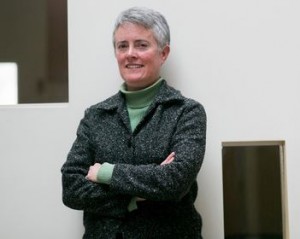
The myth that gay men and lesbian women are economically better off is so pervasive in society that it is largely taken for granted that they are. That they have larger disposable incomes, fewer children and are better-educated has become a staple of gay lore. But economist Lee Badgett has spent the better part of her career challenging those assumptions with hard data in her quest to battle worldwide homophobia. “My long-run goal has always been the same: It’s using research to help create a more just world,” said Badgett, 54, director of the University of Massachusetts at Amherst’s Center for Public Policy and Administration. “When policy makers can pick out their favorite myth about gay people to hang their policy on, it’s pretty hard to argue against.”
According to a report from Bloomberg, “Preliminary findings showed that discrimination related to homophobia leads to less education, lower earnings, poorer health and shorter lives. The lost workplace productivity and health problems connected with homophobia cost the United States between $2 billion and $31 billion in 2012. The range is wide because data on sexual minorities is scarce,” she said.
But her fundamental thesis – that discrimination and homophobia lead to lost wages, lower productivity and lower levels of educational achievement – has been widely hailed by many of her academic contemporaries. “Lee was absolutely a pioneer,” said Gary Gates, a distinguished scholar with the Williams Institute at the University of California in Los Angeles, which focuses on sexual orientation and gender identity law and public policy, and where Badgett is also a distinguished scholar. “There was no one in economics who was really thinking about these issues.”
“Lee’s seminal research on the economics of sexual orientation was critical,” said Marieka Klawitter, a University of Washington economist in Seattle who published studies on gays after Badgett. “The myth that gays were all rich, carefree [and] without families led to the perception that they didn’t face discrimination. She took an enormous risk by doing this work, because homosexuality was stigmatized in academia, so her research could have damaged her career,” Klawitter said.
Among her other findings: Badgett used the National Opinion Research Center’s General Social Survey to show that gay and bisexual male workers made between 11 percent and 27 percent less than heterosexual men with similar experience, education and region of residence.
And her expertise hasn’t been confined to academia. She has spoken before the U.S. Congress where her findings have helped prompt President Obama in his drive to ban employment discrimination based on sexual orientation or gender identity in federal contacts. Further, her work has been seminal in assisting the World Bank on a new initiative focusing on social inclusion to help end extreme poverty and promote shared prosperity. As part of this, Badgett created an economic model that she applied to India in a case study presented at the bank in March.
“She was a little bit early, but she eventually caught the wave of increasing sympathy for gay rights,” said William Dickens, one of Badgett’s advisers at Berkeley and now a labor economist at Northeastern University in Boston.
She was also called on to testify in Perry v Schwarzenegger – Prop. 8 – to help show how the ban on same-sex marriage was not only unconstitutional but economically disadvantageous to gay men and women. Same-sex marriage also has personal relevance for Badgett, who wed Elizabeth Silver, an attorney, in 2005, the year after it became legal in Massachusetts.











